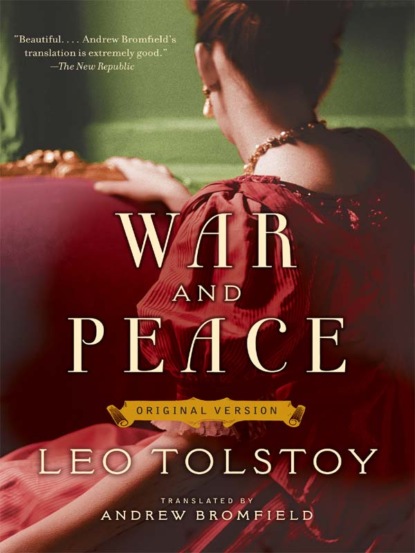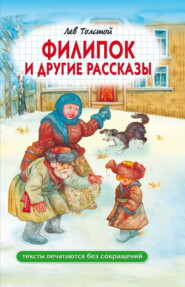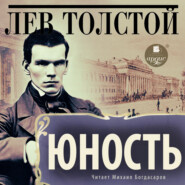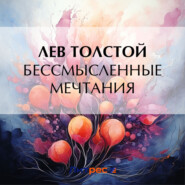По всем вопросам обращайтесь на: info@litportal.ru
(©) 2003-2025.
✖
War and Peace: Original Version
Автор
Год написания книги
2019
Настройки чтения
Размер шрифта
Высота строк
Поля
“Lise,” Prince Andrei said coldly, raising his tone of voice to a level that indicated his patience had been exhausted.
Suddenly the angry, squirrel-like expression on the princess’s beautiful little face was replaced by an expression of fearful appeal that aroused compassion; she cast her husband a sullen glance out of her lovely eyes, and her face assumed the timid expression of a dog rapidly but feebly wagging its lowered tail in a confession of guilt.
“Mon Dieu, mon Dieu!” said the princess and, gathering up the folds of her dress in one hand, she went up to her husband and kissed him on his brown forehead.
“Bon soir, Lise,” said Prince Andrei, rising and kissing her hand courteously, as though it were a stranger’s.
XI
The friends were silent. Neither said a word. Pierre kept glancing at Prince Andrei; Prince Andrei rubbed his forehead with his small hand.
“Let’s go and have supper,” he said with a sigh, getting up and moving towards the door.
They entered a dining room newly decorated in an elegant and rich style. Everything, from the napkins to the silver, porcelain and crystal, bore the special imprint of that newness and elegance which distinguish the household of a young married couple. In the middle of supper Prince Andrei leaned his elbows on the table and, like a man who has held something in his heart for a long time and suddenly decides to speak out, he began talking with an air of nervous irritation that Pierre had never seen in his friend before.
“Never, never marry, my friend, that is my advice to you, do not marry until you can tell yourself that you have done everything that you could, and until you have stopped loving the woman that you have chosen, until you can see her clearly, or you will commit a grievous and fatal error. Marry as an old man no longer good for anything … Or everything that is fine and exalted in you will be destroyed. It will all be frittered away on trifles. Yes, yes, yes! Do not look at me with such amazement. If you expect anything of yourself in the future, then you will feel at every step that for you everything is over, all doors are closed, except to the drawing room, where you will stand on the same level as the household flunkey and the idiot … I tell you!”
He gestured emphatically with his hand.
Pierre removed his spectacles, which changed the expression of his face, making his kindness even more obvious, and looked at his friend in surprise.
“My wife,” continued Prince Andrei, “is a lovely woman. She is one of those rare women with whom one need not be concerned for one’s honour; but, my God, what would I not give now not to be married! You are the only person I have told about this, because I am so fond of you.”
As he said this Prince Andrei resembled even less than before the gentleman who had sprawled in Anna Pavlovna’s armchair, narrowing his eyes as he pronounced French phrases through clenched teeth. Every muscle in his lean, brownish face was quivering in nervous animation; his eyes, in which the fire of life had earlier seemed extinguished, now glowed brightly, glinting and glittering. It was clear that the more listless he seemed at ordinary times, the more intensely energetic he was at such moments of almost morbid agitation.
“You don’t understand why I say that,” he went on. “It’s an entire life story. You talk about Bonaparte and his career,” he said, although Pierre had not even mentioned Bonaparte. “You talk about Bonaparte, but Bonaparte graduated from a course at the artillery college and went out into the world when there was war and the road to glory was open to everyone.”
Pierre looked at his friend, clearly prepared in advance to agree with whatever he might say.
“Bonaparte went out into the world and immediately found the place he was meant to occupy. And who were his friends? Who was Josephine Beauharnais? My five years of life since I left the Corps de Pages have been nothing but drawing rooms, balls, illicit affairs, idleness. Now I am setting out to war, to the greatest war that there has ever been, and I know nothing and am good for nothing. I am amiable and sharp-tongued, and I am listened to at Anna Pavlovna’s, but I have forgotten what I used to know. I have only just begun to read, but it is all a jumble. And there can be no soldier without knowledge of military history, mathematics and fortifications. And this stupid society, without which my wife cannot live, and these women … I have known success in high society. The most exquisite of women have flung themselves at me. But if you could only know what all these exquisite women are like, and women in general! My father is right. He says that nature is not all-wise, because she was unable to devise a means for the propagation of humankind without woman. Egotism, vanity, stupidity, pettiness in all things – that is all women for you when they show themselves as they are. Look at them in society and there seems to be something to them, but there is nothing, nothing, nothing! No, do not marry, my dear friend, do not marry,” Prince Andrei concluded, and he shook his head as emphatically as if everything he had said were a truth that no one could possibly doubt.
“I think it is funny,” said Pierre, “that you regard yourself, yourself as unqualified, and your life as a spoiled life. You have everything, everything ahead of you. And you …”
He did not say what it was Andrei did, but his tone alone revealed how highly he thought of his friend and how much he expected from him in the future.
In the very best, the most friendly and direct of relationships, flattery or compliments are necessary, as grease is needed to make wheels turn.
“I’m a failure,” said Prince Andrei, but from the proud way in which he raised his handsome head so high and the bright gleam in his eyes, it was clear how little he believed in what he had said. “But why bother talking about me? Let’s talk about you,” he said, pausing for a moment and smiling at his own consoling thoughts. That smile was instantly reflected on Pierre’s face.
“Why bother talking about me?” said Pierre, extending his mouth into a carefree, jolly smile. “What am I? I am an illegitimate son.”
And suddenly, for the first time in the whole evening, he blushed a deep crimson. It had obviously cost him a great effort to say that. “With no name and no fortune. But what of it, it is really …”
But he did not say what it really was.
“I am free for the time being, and I like it. I simply do not know what I ought to start doing. I wanted to ask your serious advice.”
Prince Andrei looked at him with kindly eyes. But even so his friendly and affectionate glance expressed an awareness of his own superiority.
“You are dear to me, especially because, in the whole of our high society, you are the only person who is alive. You’re fortunate. Choose whatever you like, it doesn’t matter. You will always fit in anywhere, but just one thing: stop going to see these Kuragins, leading that kind of life. It doesn’t suit you at all: all this bingeing and playing the hussar, and all the rest of it.”
“Do you know what,” said Pierre, as if a happy thought had just occurred to him, “seriously, I’ve been thinking that for a long time. Living like that I cannot make decisions, or think anything through. My head hurts, I have no money. He invited me today, I shan’t go.”
“Give me your word, your word of honour, that you won’t go!”
“Word of honour.”
“Make sure, now.”
“Of course.”
XII
It was after one in the morning when Pierre left his friend’s house. It was a bright St. Petersburg June night. Pierre got into a cabby’s carriage with the intention of going home. But the closer he came, the more strongly he felt the impossibility of getting to sleep on this night that was more like an evening or a morning. He could see for a long way in the empty streets. He pictured Prince Andrei’s animated, handsome face and heard his words – not about his relations with his wife (that did not interest Pierre) – but his words about the war and the future life that might await his friend. Pierre loved and admired his friend so unconditionally that he could not accept that, the moment Prince Andrei desired it, everyone would not acknowledge him as a remarkable and great man, whose nature was to command, not to obey. Pierre simply could not imagine that anyone at all, even Kutuzov, for instance, would have the courage to issue commands to a man so evidently born to take the leading role in everything as he conceived Prince Andrei to be. He imagined his friend before the assembled troops, on a white steed, with a terse, forceful speech on his lips; he imagined his courage, his successes, his heroism and everything that most young men imagine for themselves. Pierre recalled that he had promised to repay a small gambling debt today to Anatoly, at whose house the usual company of gamblers had been due to gather that evening.
“Go to Kuragin’s,” he said to the driver, thinking only of where he could spend the remainder of the night, and completely forgetting the promise he had given Prince Andrei not to visit Kuragin.
On arriving at the porch of the large house in which Anatole Kuragin lived beside the Cavalry Guards barracks, he recalled his promise, but immediately, as happens with those people who are described as lacking in character, he wanted desperately to go in and take another glance at that dissolute life with which he was so familiar and so bored, and the thought came to him of itself that the promise he had given did not mean anything and, moreover, he had also promised Anatoly, before Prince Andrei, that he would bring the money he owed: finally, he thought that all these words of honour were mere conventions, without any definite meaning, especially if you realised that tomorrow perhaps he would die or something so unusual would happen to him that nothing would be honourable or dishonourable any longer.
He walked up to the well-lit porch, on up the stairs and went in through an open door. There was nobody in the sumptuous entrance hall, but there were empty bottles lying about, a heap of bent playing-cards in the corner, cloaks and galoshes; there was a smell of wine; he could hear talking and shouting in the distance.
Evidently the gambling and supper were already over, but the guests had not yet departed. Pierre took off his cloak and went into the first room, in the centre of which there stood a life-size statue of a racehorse. Here he could hear the racket from the next room more clearly, the familiar sound of six or eight men laughing and shouting. He went into the next room, where the remains of supper were still on the table. About eight young men, all without frock coats and mostly in military riding breeches, were crowding around an open window and all shouting incomprehensibly in Russian and French.
“I bet a hundred with Chaplin!” shouted one.
“Make sure you don’t support him!” shouted another.
“I’m for Dolokhov!” shouted a third. “Part our hands, Kuragin!”
“All in one breath, or you’ve lost!” shouted a fourth.
“Yakov, let’s have the bottle, Yakov!” shouted the master of the house, a tall, statuesquely handsome fellow standing in the middle of the crowd. “Stop, gentlemen. Here he is, Pierre!”
“Ah! Pyotr! Petrusha! Peter the Great!”
“Peter the Stout!” everybody began shouting from every side, crowding round him.
Every one of the red or blotchy young faces expressed delight at the sight of Pierre, who removed his spectacles and wiped them as he looked at all this crowd.
“I don’t understand a thing. What’s going on?” he asked with a good-humoured smile.
“Stop, he’s not drunk. Give me a bottle,” said Anatole, and taking a glass from the table, he went up to Pierre.
“First of all, drink.”
Pierre began drinking glass after glass without speaking, peering out from under his brows at the drunken guests, who had crowded round the window again, discussing something that he did not understand. He drank one glass at a gulp; Anatole poured him another with a meaningful expression. Pierre drank it resignedly, but more slowly than the first. Anatole poured a third. Pierre drank that one too, although he paused twice in order to catch his breath. Anatole stood beside him, gazing by turns with his beautiful, big eyes at the glass, the bottle and Pierre. Anatole was a handsome fellow: tall and full-bodied, white-skinned and ruddy-cheeked; he had such a high chest that his head was inclined backwards, which gave him a haughty air. He had a lovely fresh mouth, thick light-brown hair, slanting black eyes and a general appearance of strength, health and the good nature of vivacious youth. But his beautiful eyes with the wonderful, regular black brows seemed to have been made less for looking than for being looked at. They seemed incapable of changing their expression. It was only clear that he was drunk from his red face, and even more so from his unnaturally out-thrust chest and the wide stare of his eyes. Even though he was drunk and the upper half of his mighty body was clad in nothing but a shirt open at the chest, from the faint aroma of perfume and soap which surrounded him, mingling with the smell of the wine he had drunk, from his hairstyle, painstakingly pomaded in place that morning, from the elegant cleanness of his plump hands and superbly fine linen, from that distinctive whiteness and delicate smoothness of his skin, the aristocrat was apparent even in his present condition, by virtue of the habit, acquired in childhood, of painstaking and lavish care for his own person.
“Come on, drink it all! Eh!” he said seriously, handing Pierre the last glass.

















